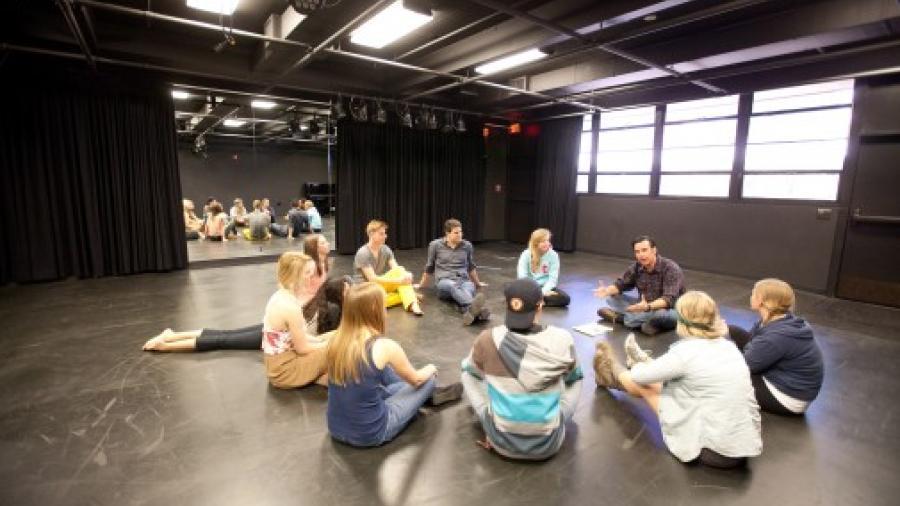Westmont Magazine Actor Finds a Fitting Role as Teacher

Mitchell Thomas enjoys investing time in students and continues to pursue work as an actor
Mitchell Thomas relished his erratic schedule as a full-time professional actor. “My agent would call, and the next day I’d end up somewhere I never expected to be,” he says. He appreciated these adventures, but they disrupted his life with his wife, Sarah, and their three daughters.
Something else bothered him about the profession. “Actors constantly have to network and sell themselves,” he says. “I began to wonder if I could continue to develop my artistic life and invest energy in others and not just in my own career.”
Mitchell wasn’t sure he wanted to teach, but he decided to try. He joined the Westmont faculty in 2004 and found that teaching and supporting students suited him—and that he can still pursue work as an actor.
He chairs the theatre arts department. “We’re in the midst of a surge in the number of majors,” he says. “In 2014, we’ll graduate our largest class ever.” He thinks the full cohort of full-time faculty and the growing strength of the program have attracted more students.
Each theater professor meets individually with every student in the major once a semester to discuss their work and progress. “It’s time-consuming, but it’s important,” Mitchell says. Next fall, he’ll teach a pilot class that examines a career in the arts, brings in guest artists and explores the integration of faith and learning in theater arts. The major’s senior seminar requires a capstone project that may involve a full theatrical production.
In addition to providing experiences on stage in student productions, the department seeks to strengthen internships and networking opportunities for majors. “The biggest challenge in being an actor is getting into the room to show what you can do,” Mitchell says. “It’s hard to make it in the business, and I want to help students understand this difficult reality without discouraging them.”
Every few years, the theatre department enters the annual Kennedy Center/American College Theatre Festival regional competition, which includes students from the western United States. In 2013, the regional governing board chose a scene from Mitchell’s fall production, “Much Ado About Nothing” by Shakespeare, as one of only 10 scenes presented at the festival in Los Angeles. Three students, Mak Manson, Paige Tautz and Connor Bush, were selected for the acting competition, and McKenna Mender competed as a stage manager. Westmont sent seven students; the three actors each took an acting partner. Four advanced to the semifinal round of 64 students.
“The festival is a transformative experience for students and provides a bridge to professional life,” Mitchell says. “They see performances from strong college programs, network, receive valuable feedback on their work, and audition for theater companies and graduate school. This year, one student got a job offer on the spot for the summer.”
Students who don’t become professional actors can still be involved in the theater, Mitchell notes, by starting a theater company or working with nonprofit organizations that offer theater programs to developmentally disabled people or other underserved groups.
Every other year, Mitchell leads the London Theatre Mayterm with English professor Paul Delaney. He’s talking with faculty in the English and communication studies departments about an interdisciplinary film studies program at Westmont.
Mitchell has won numerous awards for his acting and directing, including the 2008 Arlin G. Meyer Prize for directing Erik Ehn’s “The Saint Plays.” He performs with numerous theater companies and toured last year in the one-man show “The Fever.” Since 2005, he has created or commissioned more than 20 original works. He was chosen as the first artist in residence for the Ensemble Theatre Company in Santa Barbara. He earned his Master of Fine Arts from the Professional Actor Training Program at the University of Washington.
Mitchell continues to audition and sometimes finds himself waiting by the phone to see if he got a part. “It’s important to put yourself out there and see what comes back,” he says.